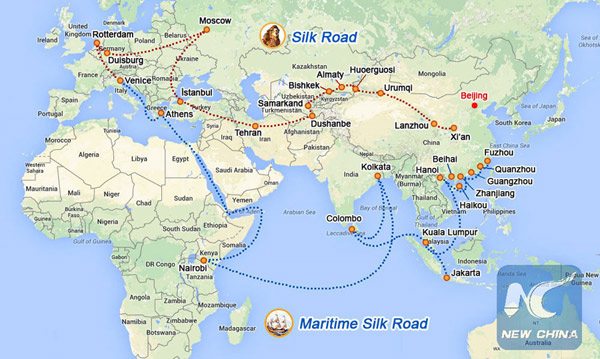 KATHMANDU, Jan. 19 (Xinhua) — Experts from Nepal and China have stressed on combined efforts of China, Nepal and India to promote the Belt and Road Initiative, saying the China-proposed initiative can play a crucial role for the development of the entire South Asia region.
KATHMANDU, Jan. 19 (Xinhua) — Experts from Nepal and China have stressed on combined efforts of China, Nepal and India to promote the Belt and Road Initiative, saying the China-proposed initiative can play a crucial role for the development of the entire South Asia region.
Experts from the two countries made such remarks during a two-day conference organized jointly by Xinhua news agency’s Kathmandu bureau and Hebei University of Economics and Business of China, which concluded on Wednesday.
Professor Li Tao, who is the executive deputy director at the Institute of South Asian Studies, Sichuan University, said the Belt and Road Initiative has received affirmative response from partner states including Nepal.
“Both China and South Asian countries (Nepal included) are developing countries. They have reached a consensus in developing economy so as to improve livelihood of its citizens.”
Nepal’s peaceful co-existence and non-alignment policy is in line with China’s independent foreign policy of peace, Li said.
The rise of Asia is a major development in 21st century, she said.
Wang Yiwei, professor at the School of International Studies, Renmin University of China, said the Belt and Road Initiative will help other nations achieve their dreams so that prosperity is shared by all.
“Nepal is an ancient civilization-state and deserves such kind of future of common revival of civilizations by joining Belt and Road Initiative,” he said.
The Silk Road Economic Belt and 21st Century Maritime Silk Road, proposed by China in 2013, aim to build a trade and infrastructure network connecting Asia with Europe and Africa along the ancient Silk Road trade routes.
Scholars from China and Nepal aired their views on various issues pertaining to China-Nepal relations, China-India-Nepal trilateral partnership as well as Economic and Cultural Corridor, as well as the Belt and Road Initiative.
Nepalese connectivity expert Dr. Surya Raj Acharya said “Asia had taken a break in history, now it is coming back to revive those golden periods. China’s plan to revive the Silk Road Initiative suggests the same. ”
Di Fangyao, who is the deputy director of Institute of South Asia, Xizang Minzu University of China, presented the paper on the topic “Thinking in Building the China-Nepal-India Economic Corridor.”
Di said that construction of the China-Nepal-India Economic corridor will bring significant changes in South Asia and South East Asia, helping to lift millions of people out of poverty.
“Building the corridor will also enhance tolerance, mutual respect and friendship between the three countries,” Di said.
Nepalese Professor at Kathmandu School of Law Yubaraj Sangroula noted that the Belt and Road Initiative is not only beneficial for China and Nepal, but it is crucial for the entire Asian region and the world.
Nepalese diplomat Shambhuram Simkhada described the Belt and Road Initiative as a “win-win vision of international relation” for in it “lies the welfare of all.”
The two-day think tank conference was inaugurated by former Nepalese Prime Minister K.P. Sharma Oli on Tuesday. Senior leaders from ruling and opposition parties had shared their views on China-Nepal relations on Tuesday during the inaugural session of the conference.

